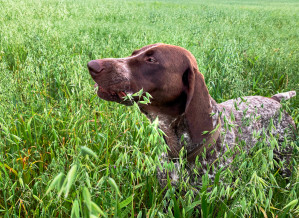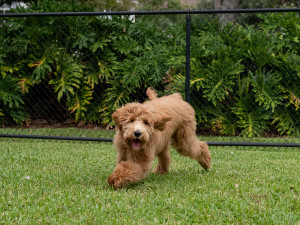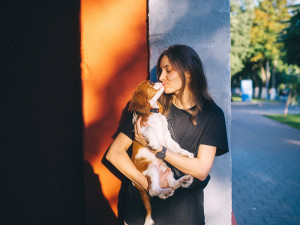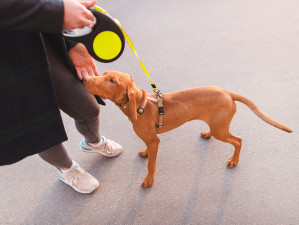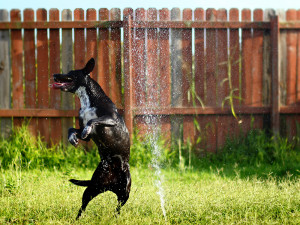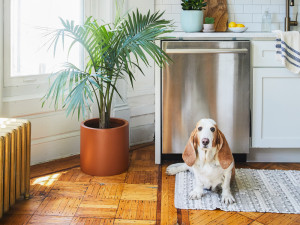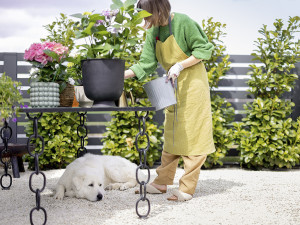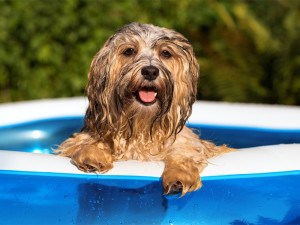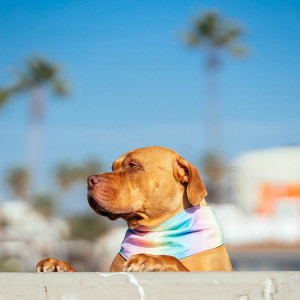How to Keep your Lawn Free from Urine Spots
Hint: Those “grass-saving” supplements for dogs don’t work — and may even harm your pup.
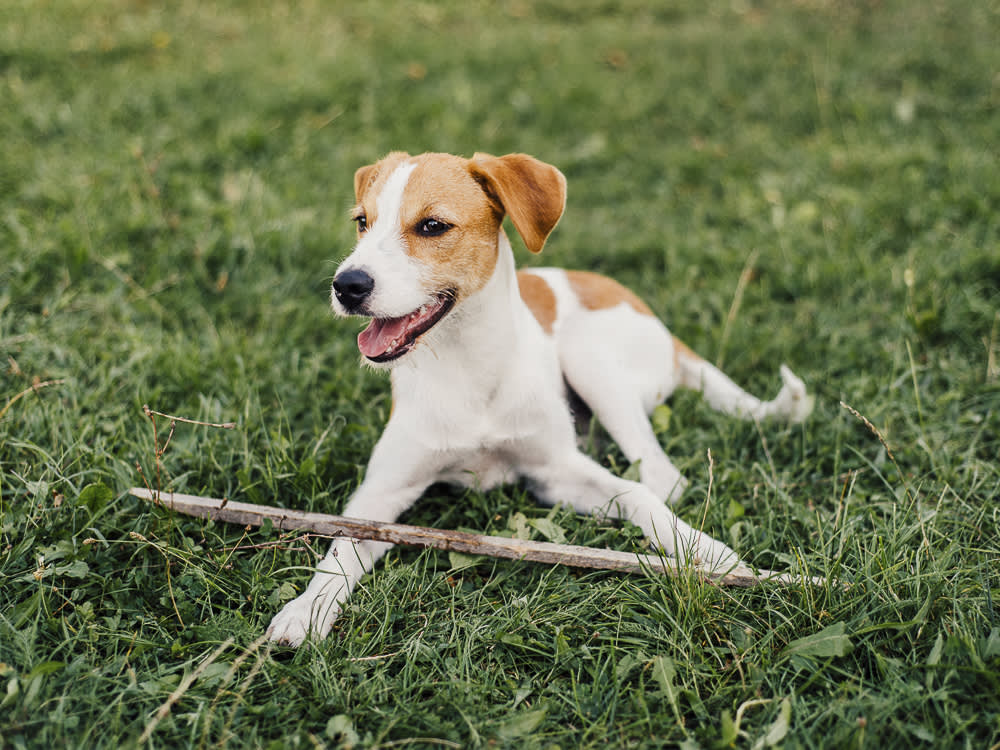
Share Article
Dogs love grass — eating it, rolling on it, playing on it and, unfortunately, “fertilizing” it. If dog pee is killing your grass, you’re not alone. But why does dog pee cause those brown spots in the first place?
It’s a common misconception that “acid” in a dog’s urine is what causes the brown spots left behind on your lawn. The culprit causing lawn burn is actually the high nitrogen content of your dog’s urine. Nitrogen is the “waste” in the urine, and it’s the result of protein breakdown through normal body processes. Urine can cause a nitrogen overload on most grasses. Female dogs are more likely to create the brown ring pattern on lawns, which some horticulturists call “female dog spot disease,” because their squatting produces a steady, concentrated stream.
Does Dog Pee Kill Grass?
Yep, dog pee kills grass. Because a canine diet is very high in protein, there will be high levels of nitrogen, and you’ll be battling blemishes for as long as your dog uses your lawn as their toilet.
A repeated vet school mantra was, “dilution is the solution to pollution,” and that concept holds equally true in the case of urine scald on your lawn. Therefore, the best way to help prevent brown spots is either by dilution or by addressing the external environment. Besides training your male dog to pee through the fence onto your neighbor’s lawn (kidding!), read on for more tips on how to keep dog pee from killing your grass.

How to Keep Your Lawn Lush And Green
The most effective way to prevent dog urine spots (grass scald) is to water the area immediately after your dog urinates. If you have easy access to a hose or a rain barrel, give the area a quick dousing. I also have a tub in my sink that I use to catch excess water when I’m at the sink; instead of letting it go down the drain, I collect it and use it to water my plants. This idea could be used to water the lawn as well, while remaining mindful of the environment.
What is the best grass for dogs?
The kind of grass you put in your yard also determines how well it will tolerate dog urine. So, if you’re planting — or replanting — a lawn, choose your grass type with that in mind. Fescue and perennial ryegrass are the most urine tolerant, while bluegrass and bermudagrass seem to be the most sensitive.
There are also several species of taller grasses (used in meadow cultivation) that are salt tolerant and fairly urine resistant including: Zoysia, Paspalum, and Distichlis. A tall meadow is a natural alternative to a traditional lawn.
Try lawn substitutes.
But you could also consider another lawn substitute like white clover or O’Connor’s strawberry clover, both of which are easy to maintain. Another plus: They require less water and, being nitrogen-fixing themselves, require less (if any) fertilization. Speaking of fertilization, if you fertilize your lawn, be sure to use a reduced nitrogen fertilizer.
Another intervention, if you don’t want to fight this battle, is the construction of a small graveled, mulched, or artificial turf area in the back or side of your yard. You can train your dog to “go to the back,” and with positive reinforcement and praise, they will eventually automatically head to that area to do their business. You can make this site visually appealing by placing potted hostas, ferns, or other greenery around the perimeter.
Do Grass Saving Supplements For Dogs Work?
Now a word about those over-the-counter medications that are touted to be “lawn-saving supplements.” I strongly caution against their use. Nothing you give your dog internally will safely stop urine from damaging grass, and the only appropriate interventions are those that address the environment — not the dog. The environmental changes discussed above may be more time-consuming work, but it’s a small price to pay if you wish to have both a lush lawn and a healthy pup.
These medications work by either changing the pH of the urine, or by adding salt to the body. And it should be reiterated: urine burn is a nitrogen problem, not a pH problem. When you use medications that alter the pH of the urine, you run the risk of causing urinary crystals or bladder stones in your dog. Certain types of crystals and stones thrive in the altered pH environment, which will create a much bigger problem than a lawn blemish.
The other “lawn-saving supplements” are actually pills that contain high amounts of salt. This, in turn, causes your dog to drink more, thereby diluting their urine (dilute the grass, not the dog!). Giving your dog high amounts of unnecessary salt is not a good option, and this is especially true if your dog has underlying kidney or heart disease.
Another recommendation I have heard is the use of gypsum salts, but I caution against them. Gypsum is calcium sulfate, and this material can cause eye, skin, oral, and respiratory irritation in your dog. You’ll never be free from dog pee, but you can avoid quick fixes and focus on long-term solutions.
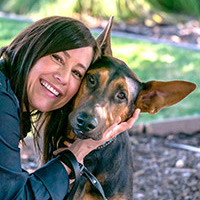
Dr. Shea Cox, DVM, CVPP, CHPV
Dr. Shea Cox is the founder of BluePearl Pet Hospice and is a global leader in animal hospice and palliative care. With a focus on technology, innovation and education, her efforts are changing the end-of-life landscape in veterinary medicine.
Related articles
![A puppy outside on a leash]()
How to Potty Train a New Puppy
Tips you’ll want to pay attention to.
![Dog-friendly backyard, dog playing in the sprinkler]()
6 Ways to Make Your Yard a Canine Xanadu
Kiddie pools aren’t just for kids!
![Basset Hound sitting in a bright sunny apartment beside a potted palm tree]()
Garden Variety: Plants Safe for Our Pups
Boutique NYC nursery The Sill gives us the dirt on dog-friendly plants.
![A dog laying under a table outside while a woman cares for her plants.]()
Follow These 4 Pet-Safe Pest Control Tips for Your Summer Garden
You need to be extra careful if your dog or cat is your gardening assistant.
![a dog in a dog pool]()
The Best Dog Pools For Your Dog to Splash Around in This Summer
It’s summer fun time, baby.
![large brown dog in a Canada Pooch cooling bandana]()
The Best Gear to Keep Your Dog Cool on Hot Summer Days
This has been the hottest summer on record, and it ain’t over yet.

